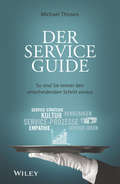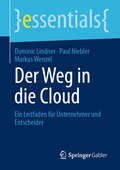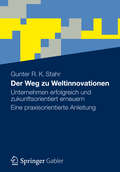- Table View
- List View
Der SEO Planer: Suchmaschinenoptimierung in Unternehmen richtig organisieren und umsetzen (mit Checklisten) (essentials)
by Udo RaafDieses Buch ermöglicht einen leichten Einstieg in die Entwicklung einer funktionierenden SEO-Strategie und soll Unternehmen helfen, Suchmaschinenoptimierung fehlerfrei zu planen. Der Autor setzt kein technisches Wissen voraus und fokussiert auf die Kernthemen, die SEO gelingen lassen.Suchmaschinenoptimierung bedeutet nicht nur „Google Optimierung“, sondern öffnet auch einen direkten Kanal zum Kunden. Wenn wir uns mit SEO beschäftigen, werden auch diese wichtigen Fragen beantwortet: Was wird eigentlich von unseren Kunden gesucht? Wie wird gesucht? Wer sind denn überhaupt unsere Kunden und wer ist der Wettbewerb? Und vor allem: wie kann ich Menschen erreichen, die das Unternehmen bisher noch gar nicht kennen?Während Social Media schwerpunktmäßig nur „Fans“ eines Unternehmens oder Organisation erreicht, kann SEO nachhaltig neue Kunden anlocken - ohne sie mit Werbung zu belästigen. Anhand der Analyse von Suchanfragen kann SEO den konkreten Bedarf der eigenen Kunden sichtbar machen. Kein Unternehmen sollte diese zentrale Aufgabe im Online Marketing komplett an Agenturen auslagern, sondern sich selbst mit Suchmaschinenoptimierung befassen und das vorhandene Wissen im Haus kontinuierlich auf- und ausbauen. Im Essential zeigt Udo Raaf, wie man als Unternehmen ins Thema einsteigt und welche Werkzeuge dabei helfen, den eigenen Content zu verbessern. Er führt dazu in 8 Schritten durch den gesamten Prozess der Suchmaschinenoptimierung und benennt alle Faktoren, die für Menschen und Suchmaschinen relevant sind, um Web-Inhalte sichtbarer zu machen. Mit einem Vorwort von Prof. Dr. Mario Fischer (Herausgeber der Fachzeitschrift „Website Boosting“).
Der Satz von Bayes: Wahrscheinlichkeitstheorie für Finanzen und Betriebswirtschaft (essentials)
by Pablo PeyrolónDer Satz von Bayes gehört zu den wichtigsten Formeln der Wahrscheinlichkeitsrechnung. Von medizinischen Labordiagnosen bis zu Finanzmarkt-Prognosen lassen sich mit der Bayes-Formel vielseitige Anwendungen erfolgreich gestalten. In diesem essentials wird eine kurze visuelle Herleitung des Satzes von Bayes beschrieben und eine Einführung zur bedingten Wahrscheinlichkeit sowie eine einfache Darstellung mit Baumdiagrammen vorgestellt. Mit Beispielen werden die Anwendungen für Finanzen und Betriebswirtschaft lebendig erklärt.Der Autor:Dr. Pablo Peyrolón ist Lektor für International Financial Management und für Economics with Game Theory an der FH Wien der WKÖ (University of Applied Sciences for Management & Communication), Ökonom, Neurowissenschaftler und Master in Finanzen.
Der Schutz fairer Wettbewerbsbedingungen im Fall drittstaatlicher Subventionen: Insbesondere bei Unternehmensübernahmen und im Bereich der öffentlichen Auftragsvergabe
by Tim KloseDen EU-Binnenmarkt zu schützen ist fundamentale Grundvoraussetzung für die Existenz und den Fortbestand der Europäischen Union. Im Lichte dessen wurde am 14. Dezember 2022 die VO 2560/2022 zur Regulierung verzerrender drittstaatlicher Subventionen auf dem EU-Binnenmarkt erlassen. Sie trat im Januar 2023 in Kraft. Das neue Regelungsregime ist dabei ein Novum; überwindet es bisherige klassische dogmatische Grenzen auf EU-Ebene, verbindet klassisch kartellrechtliche Elemente, Elemente des EU-Beihilferechts, des EU-Vergaberechts und des EU-Außenwirtschaftsrechts mit dem Ziel, den EU-Binnenmarkt robuster gegenüber Verzerrungen durch drittstaatliche Subventionen zu machen. Die vorliegende Untersuchung macht es sich zur Aufgabe, die neue Verordnung umfassend auf ihre Rechtmäßigkeit im Sinne der aufzuzeigenden Problemstellung hin zu untersuchen. Dabei liegt den Ausführungen insgesamt die These und deren Überprüfung zugrunde, dass die Verordnung zukünftig keine, wie teilweise gefordert, faktisch völlige Gleichbehandlung zwischen mitgliedstaatlichen Beihilfen und drittstaatlichen Subventionen sichert, die Verordnung gleichwohl aber zum Schutz fairer Wettbewerbsbedingungen auf dem EU-Binnenmarkt beitragen wird.
Der Service Guide: So sind Sie immer den entscheidenden Schritt voraus
by Michael ThissenViele Unternehmen haben noch nicht erkannt, dass heutzutage guter Service ein Alleinstellungsmerkmal ist, man dümpelt weiter in der Servicewüste rum.Dabei kann ein gut strukturierter Service Ihnen ungeahnte Wettbewerbsvorteile bringen. Und genau hier setzt ?Der Service-Guide? an, mit einer Fülle an Checklisten und Handlungsanweisungen gibt er das Rüststzeug an die Hand um optimalen Service im Unternehmen zu etablieren. Wie muss man Service richtig verstehen? Wie setzt man Servicestrukturen auf? Wie funktionieren Serviceprozesse und wie optimiert man Services? Zusätzlich gibt es viele weitere Informationen, die einem Unternehmen helfen können, sich serviceorientierter aufzustellen. Eine Besonderheit ist das zusätzlich zum Buch bereitgestellte Service-Radar, mit dessen Hilfe die Schwächen in einer Organisation erkannt und entsprechende Handlungsmaßnahmen im Buch erläutert und direkt in die Tat umgesetzt werden können. Hier erkennt jeder seine Schwachstellen und findet Standards, die helfen, den Service-Alltag zu erleichtern und "echten" Service in der Abteilung zu generieren. "Der Service-Guide" von Michael Thissen vermittelt Grundlagen so, dass sie jeder in seiner Abteilung direkt und einfach implementieren kann. Service, wie ihn bisher noch niemand auf dem Schirm hatte!
Der Sinn und Zweck der öffentlichen Rechnungslegung: Implikationen für die Ausgestaltung des Rechnungslegungssystems (Rechnungswesen und Unternehmensüberwachung)
by Theresa UmmenhoferDas öffentliche Rechnungswesen ist sowohl national als auch international von Mischformen und Kombinationen unterschiedlicher öffentlicher Rechnungslegungsstile geprägt, sodass ein äußerst heterogenes Bild entsteht. Die Arbeit untersucht vor diesem Hintergrund die Ausgestaltung eines sachgerechten öffentlichen Rechnungslegungssystems unter Berücksichtigung der staatlichen Besonderheiten sowie des zugrunde liegenden Sinn und Zwecks der öffentlichen Rechnungslegung. Die Analyse basiert auf einer kritischen Würdigung der Übernahme von privatwirtschaftlichen Konzepten im öffentlichen Bereich und verdeutlicht die dabei auftretenden Probleme. Theresa Ummenhofer stellt ihren eigenen Modellvorschlag zur zweckadäquaten Abbildung öffentlicher Geschäftsvorfälle vor.
Der Social-Media-Zyklus: Schritt Für Schritt Zum Systematischen Social-media-management Im Unternehmen
by Alexander DeckerDas Buch bietet mit dem Social-Media-Zyklus einen systematischen Ansatz zum strategischen Management von Social Media. Es illustriert die Vorgehensweise praxisnah mit vielen Beispielen und Checklisten. Unternehmen können anhand des Social-Media-Zyklus Schritt für Schritt die strategische Ausrichtung ihres Social-Media-Marketings entwickeln und im Alltag erfolgreich managen. Studierende lernen Grundlagen und einen konkret anwendbaren Ansatz für systematisches Social-Media-Management kennen.Als Unternehmen kann man heute nicht nicht Social-Media betreiben. Jedoch kommt im Alltag das systematische Vorgehen häufig zu kurz. Der strategiegeleitete Social-Media-Zyklus füllt diese Lücke. Er bietet Entscheidern und Social-Media-Managern eine konkrete Schritt-für-Schritt-Hilfestellung – beginnend bei „dem Kunden zuhören“, über die Strategie, Planung und Redaktion, den Umgang mit Shitstorms bis hin zu Social-Media-Analytics.
Der UNI-Coach: So kommst du entspannt, motiviert und erfolgreich durch dein Studium
by Martin SutorisVorlesungspläne, Studium in Rekordzeit, Praktikum in den Ferien, am besten noch ein Auslandsaufenthalt … und dann sind da noch der Nebenjob, die Freunde, Hobbys usw. Angesichts dieser Fülle an Herausforderungen ist es nicht leicht, entspannt und motiviert zum erfolgreichen Abschluss zu gelangen. Dieser Ratgeber stellt effektive Entspannungsmethoden, Motivationstechniken und Übungen vor, die einfach in den Studienalltag zu integrieren sind und beispielsweise in folgenden typischen Unisituationen schnell Abhilfe schaffen können:- Prüfungsangst- Nervosität in Referaten- Konzentrationsprobleme- Allgemeine Überforderung- Motivationsdurchhänger Wer diesen UNI-Coach liest, kommt garantiert entspannt und motiviert zum Erfolg!
Der Umgang der Polizei mit migrantischen Opfern
by Hans-Joachim Asmus Thomas EnkePolizeiliche Unsensibilität im Umgang mit Migranten(opfern) ist kein singuläres sondern ein systemisches Phänomen, dessen Ursachen, Reproduktionsmechanismen und Rechtfertigungen im Mittelpunkt der vorliegenden Untersuchung stehen. Die Vorschläge für eine Anreicherung der kulturellen Kompetenz der Polizeibeamtinnen und -beamten aller Hierarchieebenen beruht auf diesen Erkenntnissen. Als ,,Verfassungsarbeiterin" ist die Polizei verpflichtet, in ihrem Handeln die Grundrechte zu wahren. Soweit ihr normativer Anspruch, ihre normative Bindung und die Erwartungen des Bürgers. Ihre Einsatzpraxis gegenüber den verschiedenen kulturellen Gruppen wird jedoch - durch verschiedene Ereignisse hervorgerufen - immer wieder in der medialen Öffentlichkeit und Politik kritisiert.
Der Umgang mit Agilität in der Unternehmenskultur: Herausforderungen und Lösungsansätze (essentials)
by Michael Neumann Philipp Diebold Eva-Maria SchönIn diesem essential wird die Wichtigkeit des erfolgreichen Zusammenspiels von Unternehmenskultur und Agilität herausgearbeitet: Aktuelle Studien zeigen, dass agile Arbeitsweisen verstärkt in Unternehmen eingeführt werden; es jedoch auch Barrieren bei der Einführung gibt, die ihren Ursprung u.a. im Aufeinandertreffen unterschiedlicher Kulturen und Arbeitsweisen haben. Die Autor:innen gehen auf vier Herausforderungen detailliert ein, die sich auf die Fehler- & Lernkultur, die Angst vor Experimenten, das fehlendes Vertrauen gegenüber den Menschen der Organisation sowie zuletzt die Führungs- & Entscheidungskultur beziehen. Diese werden anhand praxisnaher Beispiele diskutiert und ihre Ausprägungen für die Ebenen Organisation, Team und Individuum erläutert. Für jeden Themenschwerpunkt gibt es Tipps für die Praxis, die dabei unterstützen, die Probleme zu erkennen und zu mildern.
Der Umgang mit Differenz in der Polizeiarbeit: Eine auto-ethnografische Untersuchung
by Marcel MüllerIn dieser (auto-)ethnografischen Studie geht es in erster Linie um die Frage, wie sich verschiedene Differenzen – etwa sprachliche, ethnische, kulturelle oder sozio-ökonomische Unterschiede – auf die polizeiliche Praxis auswirken und wie Polizist*innen im Rahmen der Polizei-Bürger-Interaktion üblicherweise mit den verschiedenen Fremdheitsmarkierern umgehen. In diesem Kontext ist vor allem von Interesse, welche Ansätze und Strategien die Polizeibeamt*innen verfolgen, um die auftretenden (Verständnis-)Probleme im Alltag zu lösen und was geschieht, wenn es ihnen nicht gelingt, die auftretenden Differenzen zu überwinden. Dabei ist gleichermaßen von Bedeutung, in welchen Situationen die Beteiligten konkret zu einer Kulturalisierung (oder Entkulturalisierung) der Interaktion beitragen und was sie sich hiervon in der Regel versprechen. Hierbei fokussiert die Untersuchung ebenso auf die hiermit verbundenen Grenzziehungspraktiken der beteiligten Akteur*innen – und zwar nicht nur im Hinblick auf Polizei-Bürger-Interaktion, sondern auch hinsichtlich des Binnenlebens der Polizei als Institution.
Der Unternehmensverkauf: Strategien und Strukturen für den erfolgreichen Exit
by Christopher HahnDieses Buch richtet sich an Gründer, Inhaber und Manager, die ihr Unternehmen erfolgreich verkaufen möchten. Es vermittelt ein praxisnahes Verständnis für Strategien, Strukturen und typische Regelungen bei einem Unternehmensverkauf. Der Autor bringt dabei nicht nur seine juristische Expertise, sondern auch eigene unternehmerische Erfahrung ein: Als Gründer und Verkäufer von Unternehmen kennt er beide Seiten des Verhandlungstischs. Auf leicht verständliche Weise werden die verschiedenen Verkaufsoptionen erläutert und gezeigt, wie Verkäufer durch gut strukturierte Prozesse und gezielte Vertragsgestaltung den bestmöglichen Kaufpreis und optimale Konditionen erzielen können.
Der Vorteil: Warum nur vitale und robuste Unternehmen in Fuhrung gehen
by Patrick M. LencioniEs gibt für Unternehmen einen Wettbewerbsvorteil, der mächtiger als jeder andere ist. Handelt es sich dabei um eine überlegene Strategie? Schnellere Innovationen? Klügere Mitarbeiter? Nein, sagt der New-York-Times-Bestsellerautor Patrick Lencioni: Der unschlagbare Vorteil, der Ihnen langfristig Erfolg und Leistung sichert, ist organisatorische Gesundheit, denn »Vitalität ist der größte Wettbewerbsvorteil für jedes Unternehmen. Der Weg dahin ist leicht, kostet nichts und steht allen offen, und trotzdem ignorieren ihn die meisten Führungskräfte.« Wie Sie diesen Weg gehen können, zeigt Ihnen Patrick Lencioni. In Der Vorteil vereinigt er seine enorme Erfahrung als erfolgreicher Unternehmensberater und viele Erkenntnisse aus seinen bisherigen Büchern. Es ist eine umfassende Darstellung des einzigartigen Vorteils, den organisatorische Gesundheit bietet. Angereichert mit Geschichten, Tipps und Anekdoten führt er Sie in wenigen, leicht umsetzbaren Schritten zu einem gesunden und damit erfolgreichen Unternehmen. Sie lernen in diesem Buch, wie Sie erreichen, dass Management und Mitarbeiter an einem Strang ziehen und ein gemeinsames Ziel verfolgen, ohne politische Ränkespiele, Grabenkämpfe und Chaos. So übertreffen Sie Ihre Konkurrenten und bieten ein Umfeld, das Topleistungsträger nie verlassen wollen.
Der Wachstumzwang: Warum die Volkswirtschaft immer weiterwachsen muss, selbst wenn wir genug haben
by Mathias BinswangerMit dem Wirtschaftswachstum war über lange Zeit ein Heilsversprechen auf bessere Zukunft verbunden, das sich großenteils auch bewahrheitet hat. Doch aus diesem Heilsversprechen wird in neuester Zeit zunehmend eine Zwangshandlung. Für eine steigende Zahl von Menschen in reichen Ländern ist mehr materieller Wohlstand kein glaubhaftes Versprechen mehr auf ein noch besseres zukünftiges Leben. Deshalb wird Wachstum heute kaum noch mit diesem Argument begründet. Stattdessen hören wir, dass ein Land wie Deutschland bei geringem oder ausbleibendem Wachstum gegenüber anderen Ländern zurückbleibt, als Wirtschaftsstandort unattraktiv wird, an Innovationskraft einbüßt oder Arbeitsplätze verliert. Wir müssen wachsen, um wirtschaftlich erfolgreich zu bleiben, auch wenn wir gar nicht noch mehr materiellen Wohlstand wollen! Das Buch von Mathias Binswanger zeigt auf, woher dieser Wachstumszwang genau kommt. Begründet ist er letztlich in der Tatsache, dass Unternehmen insgesamt über längere Zeit nur Gewinne machen können, wenn auch ein Wachstum des BIP stattfindet. Und Gewinne sind wiederum notwendig, damit Unternehmen längerfristig überleben. In neuester Zeit ist daraus zunehmend eine Zwangshandlung geworden: Wir müssen wachsen, um wirtschaftlich erfolgreich zu bleiben, auch wenn wir gar nicht noch mehr materiellen Wohlstand wollen! Genau das ist der Wachstumszwang!
Der Wandel als Weckruf: Der Homo Creator Transcendens I (Schlüsselqualitäten des Menschseins im Wandel - Der Homo Creator Transcendens)
by Jürgen Rippel Kristina RippelDas Buch ist der Beginn einer Reise zu sich selbst und den individuellen menschlichen Qualitäten. Ein Bewusstsein dafür wird notwendiger denn je, wenn wir das universale Wandel-Prinzip beobachten, wie es gewaltig an den verständigen Säulen des Menschseins rüttelt. Umwelt, Gesellschaft und Wirtschaft werden in das Zentrum der Reflexion gestellt. Welche Absicht verbirgt sich hinter diesem Prinzip und was bedeutet dies für den Menschen, wenn er Gestaltgeber der Gegenwart und einer potentiellen Zukunft ist? In der tiefgehenden Erkundung dieser Fragen offenbart sich eindeutig, dass es menschliche Fähigkeiten braucht, die sowohl das Vordergründige als auch das Hintergründige transzendent durchdringen. Erst dann können sich Wirtschaft und Gesellschaft im Sinne des Holismus ausrichten. Vor allem bedarf es jedoch eines Menschenbildes, das den nahenden Herausforderungen gewachsen ist und sich an die Qualitäten des Menschseins erinnert. Der Mensch, der kreativ und über sich selbst hinaus zu denken und handeln vermag, wird aufgeweckt. Damit ist dieses Buch der Auftakt zur Reihe der sich wandelnden Schlüsselqualitäten des Menschseins. Mit dem Anspruch, die Dinge von der Wurzel her und zu Ende zu denken, wollen die Autoren zum Hinterfragen anregen und Antworten anbieten, die auf die nächste Ebene der Entwicklung führen können.
Der Weg in die Cloud: Ein Leitfaden für Unternehmer und Entscheider (essentials)
by Paul Niebler Dominic Lindner Markus WenzelDie Autoren untersuchen in diesem essential Chancen und Risiken der Nutzung von Cloud-Technologien und veranschaulichen das Thema durch Beispiele aus Forschung und Praxis. Sie erklären Grundlagen und Anwendungsfälle rund um Liefermodelle – Private und Public Cloud – und Servicemodelle – IaaS, SaaS und PaaS – der Cloud-Technologien. Darüber hinaus geben sie Handlungsempfehlungen für die Nutzung der Cloud, die als Input für weitere Forschung dienen und Anwender bei der Strategiefindung unterstützen.
Der Weg in ein glückliches Leben ...: ... durch nachhaltiges (Selbst-) Coaching
by Petra DenningerSei dein eigener Coach – du hast es selbst in der Hand glücklich zu sein! Wo stehe ich aktuell und was will ich ändern und wie? Mit diversen Tools und Werkzeugen hilft Ihnen dieses Buch dabei, Ihre innersten Wünsche und Ziele herauszufinden. Es ist eine Art Selbstcoaching zur Förderung der persönlichen und beruflichen Entwicklung: Viele Tipps aus der Praxis und Hilfestellungen erleichtern Ihnen den Einstieg und laden ein, sofort zu beginnenEs führt Sie fundiert und leicht verständlich durch zentrale Fragen und bietet Ihnen die Möglichkeit, Ihre Situation zu reflektieren um Klarheit über sich selbst zu gewinnenFragebögen und zahlreiche Beispiele aus der Praxis helfen Ihnen dabei, das Gelesene praktisch umzusetzenEs öffnet Ihnen die Augen, um ungesunde Denkmuster wie fehlende Selbstliebe, Angst vor Entscheidungen und Resignation sowie schädliche Gewohnheiten zu erkennenDazu zeigt es Ihnen Schritt für Schritt unterschiedliche Tools, die ihnen helfen, Ihre Wünsche umzusetzen Dieses Buch möchte jeden Einzelnen darin unterstützen, das Leben so zu gestalten, um den passenden eigenen Weg zu finden. Es eignet sich für alle, die sich weiterentwickeln und unter Anleitung mutig und zuversichtlicher werden möchten.
Der Weg zu Weltinnovationen
by Gunter R. StahrDie Welt der Wirtschaft befindet sich im Umbruch. Um das Ausmaß des Wandels zu identifizieren, ist ein praktikables Frühwarn-Instrumentarium notwendig: Im Fokus mussen gesättigte Märkten im Abstieg sowie der Aufstieg von Wettbewerbern aus China und Indien stehen. Die Auswirkungen des Wandels schaffen immense Chancen. Zur Früherkennung von Ansatzpunkten für die Suche nach Weltinnovationen für den Weltmarkt bedarf es eines Systems der Früherkennung: Konsumenten im Wandel der Bedürfnisse, öffentliche Hand als Abnehmer nach der Krise, Innovationen zur erfolgreichen Bewältigung der Klimaveränderungen. Dieses Buch bietet fundierte Antworten auf beide Herausforderungen der Zukunft.
Der Weg zum Personalkennzahlensystem: Das HR-Cockpit in der Praxis – einfach, pragmatisch, systematisch
by Heribert WienkampDieses Fachbuch gibt einen Überblick über den erfolgreichen Einsatz von Kennzahlensystemen im Personalwesen und stellt die dafür notwendigen Instrumente und Kennziffern vor. Wie der Weg zu einem Personalkennzahlensystem aussehen kann, welche Adressaten es in welchem Umfang nutzen können und wie es schließlich in einem Management-Informations-System (MIS) in Ihrem Unternehmen zu integrieren ist, erfahren Sie in diesem Buch.Ohne eine konkrete Vorstellung davon, was eine Organisation an Informationen über ihr Personal braucht, ist ein wirksames Personalmanagement nicht möglich. Durch Personalkennzahlensysteme lassen sich Personaldaten komprimiert, anwendungsfreundlich und handlungsorientiert darstellen. Entscheidend für die Qualität eines solchen Systems ist weniger die Menge an Personalinformationen, sondern die bewusste Auswahl der Daten, indem nur die Messwerte berücksichtigt werden, die die aktuelle Personalstrategie in ihrer Umsetzung und Ressourcensteuerung unterstützen und in enger Beziehung zum täglichen Personalgeschäft stehen. Aus allen wesentlichen Personalfunktionen erhalten Sie als Leser konkrete Vorschläge, Anregungen und Ideen, um Ihr eigenes unternehmensspezifisches Personalkennzahlensystem zu gestalten. Das Buch richtet sich an Führungskräfte und Beschäftigte sowohl im Personalwesen als auch in anderen Unternehmensbereichen (z. B. Controlling), die sich für das Personalmanagement in Zahlen interessieren. Aus dem Inhalt Personal-Controlling durch Personalkennzahlen Anwendungsbereiche: Personalplanung, Personalbeschaffungs- und Personalentwicklungs- planung, PersonalkostenplanungSpezielle-Anwendungen: Bildungs-Controlling, Leistungsbeurteilung, VergütungscontrollingDas HR-Cockpit als finales Informations- und Beurteilungsmedium
Der Weg zur Meisterschaft in der Führung: Führung und Selbst-Führung auf dem Weg zur Spitze
by Jutta Schanze Jürgen SchusterDie Situation der Märkte, die hohen Erwartungshaltungen unterschiedlicher Interessensgruppen und die Komplexität und Geschwindigkeit moderner Kommunikationswege sorgen dafür, dass der Druck auf die heutige Management-Welt nahezu unerträglich wird. Die Folge ist ein technokratisch geprägter Führungsstil als Notlösung – gleichzeitig entsteht eine latente Sehnsucht nach souveräner und authentischer Führung. Die Autoren vermitteln, wie Führungskräfte• sich selbst führen – kraftvoll, gelassen und reflektiert• ihr Bewusstsein für ihre eigentlichen Führungsaufgaben schärfen können, statt sich auf fachliche Detailarbeit zu konzentrieren• Orientierung geben und ihr Team stärken• Loyalität und Glaubwürdigkeit erzeugen, statt Druck aufzubauen• last but not least: ihre persönliche Meisterschaft in der Führung erreichen und weiterentwickelnZusätzlich zu profundem Wissen aus persönlicher Führungserfahrung und Beratertätigkeit nutzen Jutta Schanze und Jürgen Schuster die weltweit wiederentdeckte Führungsphilosophie der Kampfkunst: eine unschätzbare Bereicherung auf dem Weg zu innerer Ruhe, natürlicher Autorität, Entscheidungs- und Durchsetzungsstärke.
Der Weg zur Smart-Work-Experience: Die Zukunft der Arbeit zwischen HR-Tech und HR-Touch – 43 inspirierende Use Cases
by Daniel MühlbauerDie Expedition in eine bessere Arbeitswelt der Zukunft verläuft entlang der Verbindung von HR-Tech und HR-Touch. Die Herausforderungen dieser Expedition können weder allein technologisch noch allein menschlich gemeistert werden. Dieses Buch schlägt die längst überfällige Brücke zwischen zunehmend intelligenter Technologie auf der einen Seite und zunehmend vernetzter Arbeit auf der anderen Seite. Es beschreibt, wie durch die sinnvolle Verknüpfung technologischer und zwischenmenschlicher Aspekte des People Managements eine moderne Arbeitswelt gestaltet wird. Eine Arbeitswelt, die gleichsam individuelles Wachstum fördert, lebenslanges Lernen anregt und Teamerfolg ermöglicht. Es dient als Grundlage zur technologie-optimistischen und am Menschen orientierten Gestaltung der Arbeitswelt der Zukunft. Der Autor stellt sieben grundlegende Prinzipien vor, an denen das Personalmanagement jedes Unternehmens die Umsetzung der firmenspezifischen People-Tech-Strategie ausrichten kann. 43 Anwendungsbeispiele inspirieren zum sinnvollen Einsatz intelligenter Technologie entlang des gesamten People-Experience-Life-Cycle - von Pre-Hire bis Retire.Der InhaltKernelemente der Arbeitswelt der Zukunft: Intelligente Maschinen, Plattform-basierte Ökosysteme, Kooperation Gestaltungsprinzipien der Smart-Work-ExperienceAnwendungsbeispiele: Mensch-Maschine-Kooperation in der Talentakquise, -entwicklung und -bindungDer AutorDr. Daniel Mühlbauer ist Experte für HR-IT-Lösungen und beschäftigt sich mit dem sinnvollen Einsatz moderner Technologien im Personalmanagement eines globalen Großkonzerns. Er teilt sein Wissen auf seinem Blog und YouTube-Kanal namens “HR Datenliebe”. Seine Leidenschaft gilt der Kombination aus Datenanalysen, künstlicher Intelligenz und HR-Tech zur Wegbereitung in die Zukunft des Personalmanagements. Nach abgeschlossener Promotion am Institut für Personalwirtschaft der LMU München hat er ein Start-up für People Analytics mitgegründet.
Der Weg zur nachhaltigen Unternehmensführung: Wie Sie Verantwortung für Menschen, Umwelt und Wirtschaft übernehmen (SDG - Forschung, Konzepte, Lösungsansätze zur Nachhaltigkeit)
by Ralf T. KreutzerDieses Buch zeigt, wie Verantwortliche auf allen Unternehmensebenen die Herausforderungen einer nachhaltigen Unternehmensführung souverän meistern können. Hierzu werden konkrete Handlungskonzepte präsentiert.Die Welt ist im Umbruch – politisch, gesellschaftlich und hinsichtlich der natürlichen Ressourcen. Immer mehr Menschen und Institutionen legen ihren Kaufentscheidungen Kriterien zugrunde, die im weiteren Sinne auf Nachhaltigkeit einzahlen. Ralf T. Kreutzer erklärt, wie Unternehmen das Drei-Säulen-Modell der Nachhaltigkeit umsetzen können, um den Anforderungen der Wirtschaft, der Ökologie und des Sozialbereichs (Triple Bottom Line) gerecht zu werden. Gleichzeitig wird aufgezeigt, welche rechtlichen Anforderungen Unternehmen berücksichtigen müssen. Hier sind u. a. das Lieferkettengesetz sowie die Corporate Sustainability Reporting Directive zu nennen. Generell gilt es, die durch die sogenannten ESG-Kriterien (Environment, Social, Governance) beschriebenen Ansprüche seitens der Kunden und weiterer Stakeholder in die Unternehmensführung einfließen zu lassen. Zahlreiche Beispiele aus der Praxis tragen zur Veranschaulichung der Handlungsfelder bei.Der InhaltNachhaltigkeit in der Unternehmensführung und auf KundenseiteInstitutionelle und rechtliche Rahmenbedingungen eines nachhaltigen AgierensIntegration von Nachhaltigkeitskonzepten in die Purpose-Definition von UnternehmenIdentifikation und Ausschöpfung von Nachhaltigkeitspotenzialen in der eigenen WertschöpfungsketteErschließung von Nachhaltigkeitspotenzialen im Marketing und bei der MarkenführungMonitoring und Controlling zur Sicherstellung einer nachhaltigen UnternehmensführungDos & Don‘ts einer nachhaltigen UnternehmensführungEntwicklung einer Green Journey für das eigene Unternehmen
Der Wert von Führung: Mit dem Leadership Capital Index den Einfluss von Leadership auf den Marktwert eines Unternehmens ermitteln und messen
by Dave UlrichZum ersten Mal zeigt Dave Ulrich in seinem Buch, wie man den Einfluss von Leadership auf den Marktwert einer Firma effektiv ermitteln und messen kann. Dafür schlägt er den "Leadership Capital Index" vor - ein Rating für Leadership. Mit diesem Index lässt sich die Qualität von Unternehmensführung konkret messen. Ulrich analysiert dafür 2 Bereiche mit jeweils 5 Faktoren. Zum einen der individuelle Bereich, der persönliche Qualitäten und strategische Fähigkeiten der Führungskraft genauso umfasst wie die Passung zwischen dem Führungsstil und dem Marktversprechen der Organisation. Zum anderen gibt es den organisatorischen Bereich. Themen sind hier u. a. der Aufbau einer kundenorientierten Unternehmenskultur, Talentmanagement, Informationsmanagement zur Schaffung von Wettbewerbsvorteilen und Arbeitsprozesse. Für jeden dieser Faktoren führt Ulrich ausführlich präzise Maßeinheiten und Methoden zur Ermittlung und Messung auf. Ein Buch, nicht nur interessant für Investoren, die den Wert einer Firma und die Leistung der Führungskräfte ermitteln wollen, sondern auch für die Manager und Führungskräfte selbst.
Der Wille zur Freiheit
by Manfred Stern Egon BalasDer berühmter Mathematiker Egon Balas nimmt seine Leser mit auf eine erstaunliche Lebensreise: Sie erfahren von großem Mut, grenzenlosem Optimismus und von dem Leid, das Balas auf seinem Weg von Transsilvanien nach Pennsylvania begleitete. Egon Balas wurde 1922 als Sohn ungarisch-jüdischer Eltern geboren, ein Großteil seiner Familie wurde zwischen 1942-1944 ermordet. Nach dem 2. Weltkrieg geriet er in Opposition zum stalinistischen Regime in Rumänien und emigrierte 1966 in die USA. Balas gilt als einer der Pioniere der mathematischen Optimierung.
Der Wille zur Wiederholung II: Der Doppelgänger in Literatur und Film (Serienräume – global, lokal, glokal)
by Jörg Türschmann Noëlle Miller Santiago ContardoDer Band knüpft an den ersten Teil von Der Wille zur Wiederholung an, der den Untertitel Entzauberung und Faszination des Immergleichen in Literatur und Film trägt. Er widmet sich der Fiktion einer Spaltung: dem Widerspruch der Wiederholung eines Bildes in seinem Gegenbild ein und derselben Figur. Roman, Theater, Film und Fernsehen erzählen immer wieder und immer anders vom „Doppelgänger“. Sein Name ist Programm und ein Generikum, das unter der Bezeichnung Doppelganger ebenso im Englischen, Spanischen, Italienischen, Rumänischen und vielen anderen Sprachen geläufig ist. Der Germanismus steht keineswegs für kulturelle Exklusivität. Denn mit dem Aufkommen des Individualismus im 17. Jahrhundert lässt sich vielerorts ein wachsendes Interesse am Selbst und der eigenen Erfahrung beobachten wie die Erforschung des „Moi“ in Montaignes Essays. Später kreisen Psychoanalyse und Surrealismus nebst ihren postmodernen Surrogaten um das Epizentrum unbewusster Triebe mit seinem Kräftefeld aus Wünschen und Träumen. Der Doppelgänger bietet eine mögliche Darstellung eines Subjekts, das als komplex und vielschichtig verstanden wird. Im Kontext von Denkströmungen wie der Transhumanismus und die Entwicklung neuer Technologien (ChatGPT, Metaversen usw.) gewinnt dieses Thema nicht zuletzt an Aktualität, weil die digitalen Werkzeuge Strategien ermöglichen, die im Alltag die Rituale und Routinen prägen, die schon Henri Lefebvre beschreibt. Was einst eine romantische (Künstler‑)Fantasie war, kann potenziell mit den Mitteln digitaler Technik realisiert werden. Auf der einen Seite erweitern die Technologien den Subjektbegriff, auf der anderen Seite stoßen sie an die Grenzen des Bewusstseins, markiert als das Geheimnis des Menschseins. Meist bleibt es also bei einer Fantasie, die Literatur und Film gerne aus- und durchspielen. In der Fiktion ist unbestritten, dass Alltagsmenschen durch übermenschliche Kräfte zu Superhelden oder durch einen Fluch zu Monstern werden können. Angesichts dieser Fülle an figuralen Dublüren bieten die Autorinnen und Autoren dieses Bandes auf höchst anregende und abwechslungsreiche Weise Einblicke in die Diversität von Wi(e)dergänger*innen und die Synchronizität ihrer Spaltungen, Spiegelbilder, Schatten und Simulakren.
Der Zimmermann: Love, Serve, Care - die drei Prinzipien einer außergewöhnlichen Erfolgsstrategie
by Jon Gordon Jan KösterMichael wacht in einem Krankenhaus auf, mit einer Bandage um seinen Kopf und Angst im Herzen. Der Stress ein wachsendes Unternehmen zusammen mit seiner Frau Sarah aufzubauen, hatte einen Kollaps bei seiner morgendlichen Joggingrunde ausgelöst. Als Michael erfährt, dass der Mann, der ihn rettete, ein Zimmermann ist, besucht er ihn und erfährt schnell, dass dieser Mann viel mehr ist. Er baut nicht nur Möbel, sondern erschafft und beeinflusst auch Leben, Karrieren, Menschen und Teams. Während der Zimmermann seine Weisheit mit Michael teilt, versucht dieser sein Unternehmen vor Ungemach, Ablehnung, Furcht und Versagen zu bewahren. Entlang des Weges lernt er, dass es so etwas wie einen Erfolg über Nacht nicht gibt, aber dass zeitlose Prinzipien existieren, die dafür sorgen, dass Unternehmen aus der Masse herausstechen, überragend sind sowie einen entscheidenden Einfluss auf Menschen und die Welt haben. Basierend auf seiner Arbeit mit zahllosen Führungskräften, Vertriebsmitarbeitern, Sportteams, Non-Profit-Organisationen und Schulen erzählt Jon Gordon in seinem Buch eine unterhaltsame und erhellende Geschichte, die den Leser dazu inspiriert, ein besseres Leben und Karriere zu gestalten - zusammen mit der größten Erfolgsstrategie aller Zeiten. Wenn Sie bereit sind, Ihr Meisterwerk zu erschaffen, lesen Sie "Der Zimmermann" und beginnen Sie noch heute damit!
























